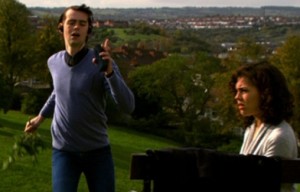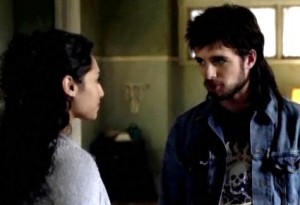A couple of weeks ago, there was a lot of discussion about how Dr. Who might translate onto American television. Some of us wondered if something that worked so well with a British audience would work in the US, especially since it’s so quintessentially British and typically somewhat educational. Being Human, which most people could easily compare to the concept of other supernatural dramas on in the US, provides a chance to see how a non-quintessencially British, non-educational show translates to US television.
Hopefully some people have stumbled across an episode of BH: US on Syfy. A lot of the first season drew from the first series of BH:UK, with the majority of the first half of the American series almost exactly remaking episodes from the original. One of those episodes, “Ghost Town” in the UK and “Some Thing to Watch Over Me” in the US, serves as a great example of the adaptation of a British show for the US small screen.
I am a huge fan of BH:UK and I enjoy BH:US as well, but in this case the American translation just didn’t work. I believe the term I’d use to best describe the adaptation of this episode as “the reason we can’t have nice, British things.” The main drive of the plot of both episodes is Annie (Sally in the US version) making friends with a male ghost from the 1980s named Gilbert (Tony in the US version). Gilbert/Tony helps Annie/Sally figure out why her spirit is unsettled and it’s just a really sweet, tragic episode.
My major problem with the adaptation of the series as a whole is that some of the episodes followed the original so closely, it was either smothering or people who had seen the original felt like turning the TV off because they had seen almost the same thing not too long before. I think that the concept itself is a fairly translatable one, but the issues arise when there’s a lack of original ideas specific to the new context that the show is put into – in this case, the shift from a BBC channel for young adults to an even more niched channel like Syfy.
The thing that ruins the new episode for me is the characterization of Tony. In the UK version, Gilbert is a great mix of cool/quirky, cigarette and records in hand. In the US version, Tony has a mullet. Enough said. Additionally, he’s not as tragic and complex as Gilbert. He’s just kind of a dude. I didn’t feel for him the same way I did the cool, brooding Gilbert. The two characters weren’t just different, they embody complete opposite sides of the 1980s aesthetic while trying to play the exact same role.
Why did so many people love the US version of The Office? Because, while it was based on the UK original and shared some character archetypes, it breathed a new kind of life into the original series. It didn’t copy, plot for plot and character for character, the things that made sense to a different kind of audience the way the beginning of BH:US did.
Luckily the show found its footing and (because it was on a longer series schedule) had to get creative and cut its cord to the original, but I was wondering if anyone had any ideas of their own about adaptations. We do it to all sorts of television programming all of the time. When does it work? When does it utterly fail? What translates and what doesn’t?



Something I’ve noticed with a few American remakes is that they seem to hurry the subtle character development type moments (or skip them altogether) and are heavy on hammering and re-hammering the overall premise or individual jokes. Because its already a hit in the UK, it’s as if the early US versions know what parts are successful and then make them too obvious or too central to let Americans appreciate them on their own. And eventually when the American versions are their own entities enough to stray from the British scripts, they tend to offer overly sentimental, schmaltzy endings to arcs and episodes which I think the British are a bit less likely to turn to. I’m thinking mainly of The Office here, but I’ve heard Skins focused too much on its own risqueness and not on getting the audience to actually like its characters. (I also remember being hit over the head with ‘the joke’ every time in what I’ve seen of the awful Spaced remake). Anyway, here’s a comparison of the American and British Being Humans I came across which sort of supports this theory of American television rushing things (http://www.gorestruly.com/2011/01/24/who-is-better-at-being-human-uk-vs-us/). Maybe it’s those constant ad breaks that changes the structure of storytelling and forces the plot and development along too quickly, or maybe some things are just lost in translation.
I completely agree with both of you. I liked how Becker introduced the pilot by saying “It’s not like an American pilot, it doesn’t beat you over the head the entire time.” That’s so true. A lot American shows do seem to beat you over the head for AT LEAST the first episode and don’t settle into things for a while and many of the British TV shows I’ve seen just throw you in. It’s great because you’re not wasting your time at all and eventually, once you get over any initial confusion you may have had, you see that confusion was worth it. Even though you’re thrown in, the spaces eventually get filled and the time that could be spent reiterating the same content can be used for things like character nuance or subtle foreshadowing. Overall, the things that fill that space make watching the show so much more fulfilling, even if you don’t realize it until you look back.
I am interested by your comment that the US version follows to closely with the UK version, for at least the first few episodes. I have never seen an episode of the American version and only the pilot of the UK version, and I must admit I am curious to tune in and see if I spot your argument about similarities. I agree, an adaptation that follows too closely to the original never seems to go over great with fans of the old/ potential new fans. But I cannot help but wonder if a US version, were it to stray too far from the original, lose some of the quality we seem to really enjoy? American vampires and werewolves are seen in Twilight and Teen Wolf as really sexy and even a little “teen angst-y”, so if Being Human were to adapt to a more Americanized version, might it lose what makes it so great in the UK? The best part of the UK version, in my opinion, is that it seems to stay away from the over-sexualized characters and stories. Again, I have yet to see an episode of the American version, but for the sake of playing devil’s advocate I can’t help but wonder if sticking to the UK map will actually help American fans continue to support the US SyFy version.
You raise a very interesting point. You’re right that it seems like it’s been very difficult for American supernatural products not to cross over to the sexy/angsty dark side, so perhaps it just proved too tempting for the BH:US writers and the only way to avoid it was to avoid writing their own stories for a while. However, I have to say the thing that made me love the US version was the shift it made when it ran out of UK material to use and began doing some really great original episodes. It’s particularly interesting because it looks like the new season, which just started, is trying to take on a sexier tone, so perhaps the non-sexy, creative glory days were short-lived. Maybe family-friendly-ish didn’t get them the ratings they wanted (sad).
The American version of The Office was great at the beginning and was very different from the British version, which proves to me that it’s possible to do an adaptation AND be creative, which I don’t think BH: US did at first. I think there’s a difference in adapting tone and adapting, almost scene-for-scene from the original story. It’s like the van Sant version of Hitchcock’s Psycho back in 1998. The remake was almost shot-for-shot and line-for-line from the original and it was horrible because the tone didn’t transfer and there was nothing new or exciting or original. That case shows that even making an almost perfect copy can’t capture the magic and that adapters should balance their own ideas with the ones they liked from the original.
My personal opinion is that if you’re going to go to the trouble to completely reshoot a TV show, you should get creative with it. In the case of BH:US, I think my original point was that the plots and stories and characters might have made more sense in their original context than they did here. Perhaps different stories or ideas would have changed the tone, but could have potentially created a better tone for an American audience.
You’re right though – I would rather have a cheap imitation than a screen full of Edward Cullin.
I think you bring up some really interesting points about what shows translate well during their trip across the Atlantic and what shows don’t. Your analysis of the similarities reminds me of the American remake of “Skins” – I didn’t watch it because the E4 show is one of my favorites, and I saw no point because the trailer for the first episode looked as if it were a shot-for-shot remake of the British series. I assume that the MTV version took all of the sensational and scintillating parts of the British “Skins” – aka sex, drugs and rock & roll – and decided that that is all that teenaged American audiences want to watch. It seemed like it lacked the heart and soul that the admittedly racy British “Skins” has.
On the other hand, there are plenty of examples of shows that did make the transition well. “The Office” is the first that comes to mind. It has been an incredibly successful show and has lasted longer than the short-run British version did. While your example of “Being Human” basically accuses the American version of presenting the British storylines by rote, but likely with a bigger budget and some stylistic changes (for better or worse), I think “The Office” has worked so well because it took the model of its predecessor and made it, if not “American,” at least applicable to its American audience. It took the premise and some of the general characteristics of the Wenhamm Hogg Paper Company workers and then really explored its own particular storylines as it saw fit. There was no effort to mimic Ricky Gervais’ show beyond the general characteristics, and it was good because of that freedom.
Why bother remaking something if you aren’t going to change anything?
The best British translations seem to be those that take a premise from a British show, strip it of some of its distinct Britishness, and make it relevant to and reflective of its American audience.